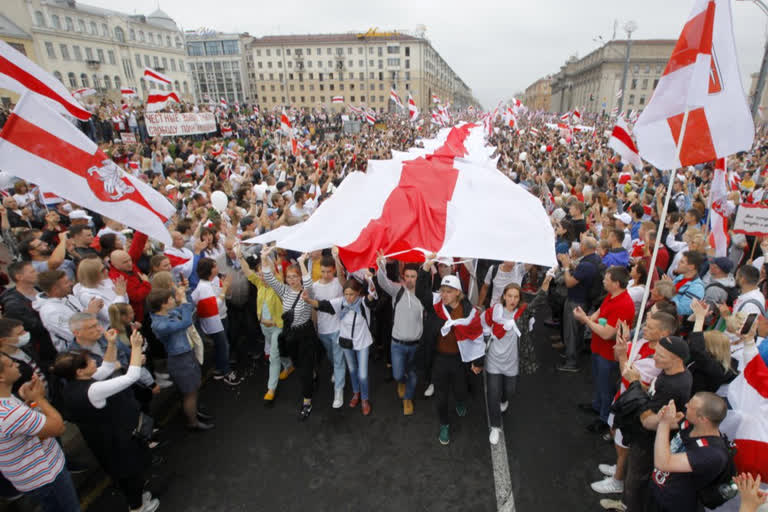Kyiv: Nearly three months after Belarus’ authoritarian president’s re-election to a sixth term in a vote widely seen as rigged, demonstrators keep swarming the streets of Belarusian cities to demand his resignation in the most massive and sustained wave of protests the ex-Soviet nation has ever seen.
Authorities have responded to protests triggered by August 9 election that gave Lukashenko a landslide victory over Sviatlana Tsikhanouskaya by unleashing a violent post-election crackdown. Police dispersed peaceful demonstrators with stun grenades and rubber bullets, detained thousands and beat hundreds, which caused protests to swell and prompted the U.S. and the European Union to introduce sanctions against Belarusian officials.
Read:|Belarus: Protesters keep up push for president's resignation
Tsikhanouskaya, who went to Lithuania after the vote under pressure from authorities, called for a nationwide strike this week that so far has failed to halt production at state-run industrial plants forming the backbone of the Belarusian economy. But observers predict that economic troubles amid a surge in coronavirus infections will fuel discontent and steadily erode Lukashenko’s grip on power.
By putting forward an ultimatum to Lukashenko to resign by October 25 or face the strike, Tsikhanouskaya has managed to mobilize and re-invigorate her supporters after nearly three months of protests. About 200,000 demonstrators flooded the Belarusian capital last Sunday, one of the biggest rallies since the protests began. Another massive protest is planned for this Sunday.
Authorities, meanwhile, have focused on derailing the opposition efforts to stage strikes at major state factories. They have moved methodically to arrest strike organizers, threatened workers with dismissals for joining the action and deployed officers of the State Security Committee still known under its Soviet name KGB to monitor the situation at industrial plants.
Lukashenko this week charged that “a terrorist war” is being waged against the government “on some fronts,” accusing the largely peaceful protesters of “radicalizing.” Following his orders, over 300 students are facing dismissal from their universities for taking part in protests.
Read:|Protesters attack police station in Minsk
While thousands of students and retirees took to the streets in Minsk pressing for Lukashenko’s resignation, and some small business owners closed their doors earlier this week, most state enterprises have continued to operate as usual.
“The scared workers couldn’t be expected to back the opposition’s political demands,” said Alexander Yaroshuk, the leader of the Congress of Democratic Unions, an association of independent labour unions. “The opposition only has managed to create some hotbeds of strikes at factories, which already can be considered a big achievement in conditions when KGB officers have flooded factory shops and raised pressure on strike organizing committees.”
But Yaroshuk noted that even though the nationwide strike hasn’t materialized, the economic stagnation will likely foment unrest in the coming months.
“The worsening economic situation could transform isolated hotbeds into the flames of a real strike,” he said.
